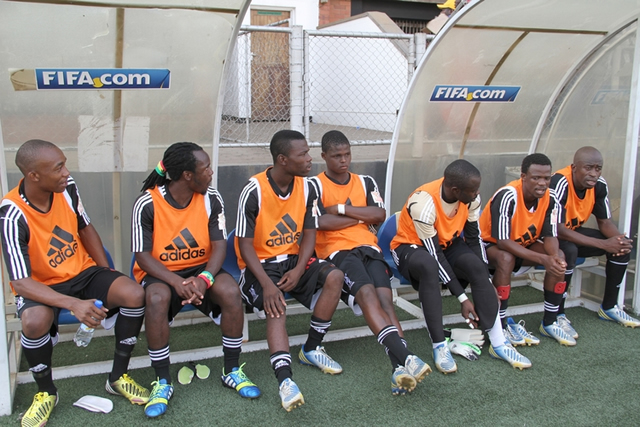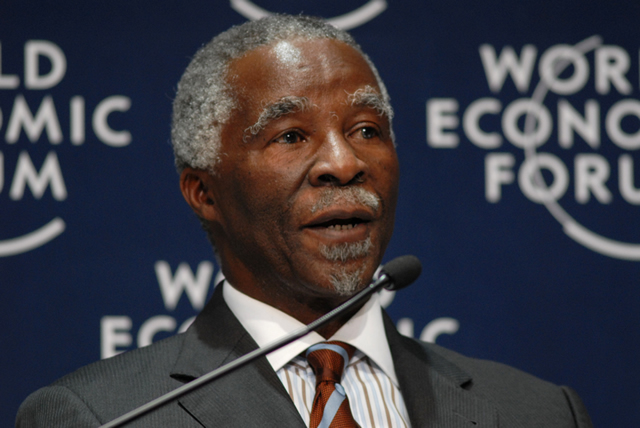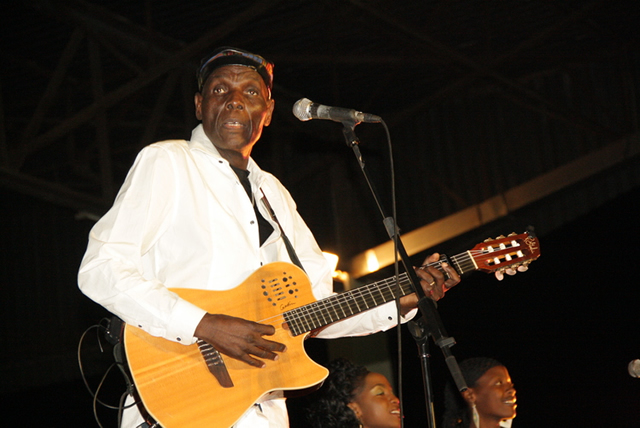Reform or Simply Die . . . the reality that confronts bridesmaids Bosso


IT’S ALL GLOOMY . . . The Highlanders bench parades a number of sad faces, during their league match against Harare City, which the Bulawayo giants needed to win to be champions but, somehow, saw them collapsing to a 0-4 defeat. — Picture by William Mafunga.
Bulawayo Bureau
HIGHLANDERS, who close their 2013 football season with a Mbada Diamonds Cup final showdown against city rivals How Mine at Barbourfields on Saturday, have missed out on the Premier Soccer League title to Dynamos on goal difference for the second season in a row.
Last year, they lost just once all season but paid the penalty for too many draws.
This season, they had the opportunity to secure the title in the penultimate game but lost 0-4 away to direct championship rivals Harare City.
Some will call it fate, but those in charge at the club should take a long and hard look at themselves.
With their illustrious history, it is scandalous that Highlanders have not won the league since 2006 — which also happens to be the last time they beat Dynamos in the Premier League.
If that statistic alone does not shock all those who love the club into taking urgent corrective steps, then nothing ever will.
In the seven years of drought at Barbourfields, Dynamos have won the title on four occasions — in 2007, 2011, 2012 and now 2013.
The question Highlanders’ administrators, coaches and players should be asking themselves today is — How have we fallen so far behind Dynamos, a club whose business and football model is exactly like ours?
No doubt, those presently in charge will trot out excuses that the malaise started well before their time.
That might be true, to an extent, but can they honestly say they have tried to change course to avoid being the nearly men of football?
Highlanders as a club cannot continue to make the mistakes of the past and expect a different outcome.
Retracing one’s footsteps to a cliff will always produce the same outcome: a jump to one’s death.
This season, Highlanders came very close to winning the Premier League title, but did they really deserve it?
Based on the team’s performances, we think not. Very few in the current team are fit to wear the famous black and white jersey.
Winning the title would have just put lipstick on a very ugly pig.
The truth is that Highlanders’ steady slide towards mediocrity has coincided with a very noticeable decline in its once-famed junior policy.
The club is not producing quality home-grown players of the calibre of Siza Khoza, Gift Lunga Jnr, Honour Gombami, Vusa Nyoni, Adam Ndlovu or Peter Ndlovu among others.
There is an evident disconnect between today’s junior teams and the first team.
Since Ali Baba Dube’s departure, Highlanders have increasingly looked outward for players — but the personnel that the club has attracted are largely over-the-hill types or average upstarts who know very little about the club’s history, traditions and what it means to be a Highlanders player.
For this, the coaches must take the flak.
But the most serious questions must be directed at Peter Dube’s executive.
What is the business plan for Highlanders? Where is the investment in players going to come from? Can they seriously look themselves in the mirror and say next season will be any different?
To dominate local football again, Highlanders need to re-visit their business model — but this needs business thinkers with proven track records to accomplish.
For far too long, the club has stuck to an impoverishing model of a “community club” living from hand to mouth.
Being a “community club” is not in itself a reason to fail.
But what is there to protect if the club is neck-deep in debt, currently estimated at US$500 000? How is the club going to repay that debt with its current hand-to-mouth model?
There are lessons that the club can learn, especially from England where each town has its “community team”.
But that’s where the similarities end.
In England, the “community teams” have serious and competent chief executives in charge who are tasked with managing their clubs as any other business.
Closer to home is perhaps the best model to study and copy: Orlando Pirates in South Africa. Pirates are, just like Highlanders, very much a community club but they have managed — over time — to reform into a serious organisation with ample financial muscle and able to compete with the likes of Mamelodi Sundowns who have Patrice Motsepe’s billions in their back pocket.
There are of course bigger problems with Zimbabwean football in as far as sponsorship and TV rights money are concerned — but this cannot be used as an excuse to delay reform.
Highlanders’ future is at stake, and it will only be secured by a very critical look at the club’s current structure and a deliberate move to implement far reaching reforms that might be painful and difficult in the short term but will bring success further up the road.
Feedback
Mark Ngosa: Your article is quite revealing and straightforward. I, however, think you were too much of a gentleman in that you fell short of laying the blame squarely on the real problem; the Highlanders executives.
Look at the crucial games we played without the coach: we struggled to draw in the game with Motor Action while we were walloped in the Harare City game.
We could have won the title had we even ‘struggled to lose’ to Harare City like gentlemen, say 0-1 and not 0-4 and better still we could have lifted the league earlier on superior points and not GD (goal difference) by beating Motor Action.
But thanks to executive, the coach was not there in all cases.
Any sane executive would not allow a coach to go on some courses at crucial times in the league and still expect to win. It is also the duty of the executive to get a coach whose values are similar to those of Highlanders, otherwise they will continue to get us mercenaries who will continue to request to go for courses at the times we need them the most.
Anyway, how did they get a coach so undeveloped, he needed to go for development courses so frequently at such wrong times, to coach a team such as Highlanders?
Highlanders (executive) lack management capacity to run the team, and as you tacitly put it, the fans and stakeholders need to demand the team’s strategic direction from the executive, failure to produce such, the executive must be kicked out of office.
Let’s take a leaf from what happened at the ZBC, which continued to under-perform until someone said enough is enough.
Some of us remain dedicated Bosso fans and are more than qualified and experienced to help Bosso strategise for better performance.
Seles: Sometime last week I submitted similar sentiments about the team. In the article, I said that the players are not committed compared to those of yesteryear. We used to Junior, Rambo, Wi (Willard Mashinkila Khumalo), Tanny Banda literally shedding tears soon after a loss because it is painful to lose a game.
These present day players who are seen in night clubs celebrating a loss do not have the club at heart at all. I have learnt to distance myself with the team’s results because they let you down uthembile.
I really do not understand why and how a title-chasing team can be clobbered 0-4 in the penultimate (game). Would they have psychologically and physically prepared for the game?
Sandile Nare: Congratulations Bosso and to the executive, keep up the good work. Compare the results of previous years and what has happened since last year. Surely as members of this BIG INSTITUTION, we should be very appreciative of what the current executive, the technical department and, of course, our gallant players have achieved under very trying time.
Corrective criticism is a good builder of strategies in any industry but not to shout abuse at people who are trying so hard to uplift the
BOSSO BRAND.
Once more congratulations. Amhlope! Looking forward to next season!
Mark Ngosa: Sandile, it’s unfortunate when I look back to years before as you suggest, all I see is failure to lift the league championship. I do not know what criteria you are using to measure good work; maybe you are happy with second best, in which case then you are right.
As far as a die-hard Bosso fan like myself is concerned, nothing is better than the best, so I am disheartened by you congratulating failure.
l This article, without the accompanying feedback, was published by our sister newspaper The Chronicle as its Leader Comment on Monday.










Comments